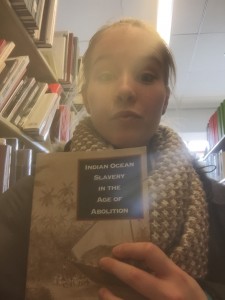Lauren Hughes
16 February 2015

Indian Ocean Slavery in the Age of Abolition
Harms, Robert, Bernard Freamon, and David Blight, eds. Indian Ocean Slavery in the Age of Abolition. New Haven: Yale UP, 2013. Print.
I started out finding this book by talking with the lady at the reference desk in the front of the library. We looked up key words Africa*, Slave*, and Trade on the library catalogue to find the area in the library where books about slave trade would be. The asterisks were important because the results included words in the titles similar to the key word typed in. For example, searching Africa* would pick up key words such as African as well. Most of the hits came up in the HT 1300’s section upstairs. I explored that section and looked at two other books before I found this one. All the books in that section had the word slavery in the title, but this book caught my eye because in class we have been talking about maritime empires and slave trade across the Atlantic and Indian oceans and this book had the words Indian, Ocean, and Slavery all in the title. I chose this book because although we have talked about slave trade in the Indian Ocean, we haven’t discussed slave trade across the Indian Ocean when it was illegal. I thought it would be really interesting to learn more about the difficulty or easiness of slave trade across the Indian Ocean when it was an abolished practice. According to the excerpt on the back, the book is about the increase in illegal slave trade in the western Indian Ocean during the 1800’s and 1900’s after Great Britain declared slavery illegal in the transatlantic world (Harms, Freamon & Blight). Britain’s act caused an increase in slave trade across the Indian Ocean because Great Britain began patrolling the Atlantic coast of Africa, so slave traders had to round the Cape of Good Hope and enter the Indian Ocean to acquire slaves (Harms, Freamon & Blight 1). The book also includes stories about the lives of real slaves who endured this journey. Overall, I think this book would be a great addition to our current material about maritime empires and slave trade across the world.